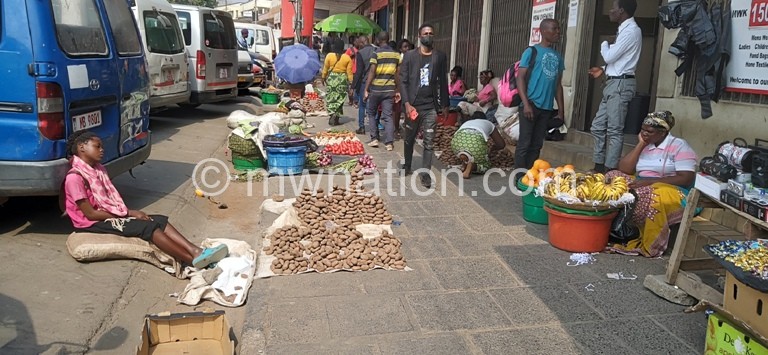Reign of chaos
Street vendors, who lost business during Operation Dongosolo in 2006, wonder why the State demolished their roadside shops but looks away as some traders reoccupy illegal spots where it flattened theirs.
Some 14 years on, a breakdown in law enforcement has paved the way for hundreds of vendors to clog the streets ostensibly made safe and more attractive by the demolition mission.

From Haile Selassie Road in Blantyre to Malangalanga Road in Lilongwe as well as M1 in Mzuzu, there seems to be no place the vendors cannot go in their unregulated appetite to bring their goods closer to passers-by.
However, the vendors’ return to undesignated zones, where shops were razed down in the night, personifies snapping law enforcement. Public transport has become a runaway train too.
In Blantyre Central Business Districts (CBD), for instance, vendors line up along pedestrian tracks and pavements of main roads, selling fresh foods, including potatoes, vegetables, fish and chicken parts as police and city council officers head home.
The new normal in the cities and towns often comes to light around sunset when the law enforcers knock off from work.

Saudya Manondo, one of the potato sellers in the shadows of shops along Haile Selassie Road, says the restricted zone is a goldmine for her small business.
“I used to sell potatoes and tomatoes inside Blantyre Flea Market, but I relocated because my friends were making quick money here,” she said in an interview on Saturday.
In Limbe, on the eastern side of Blantyre, thousands of vendors also shun the flea market in favour of the streets less patrolled by Blantyre City Council (BCC) rangers and the police.
The influx of vendors has left the streets narrower, resulting in traffic jams worsened by illegal minibus stops and an inundation of eight-sitter taxis in the city.
“The country cannot go on like this as if we don’t have a government and city councils to make laws work. Authorities have to restore order in our cities,” said Memory Bello of Bangwe Township in the commercial city.
In Limbe, vehicles are slowed by the narrow blends while a din caused by minibus touts, drivers and conductors scrambling for passengers fills the air.
The mess in Limbe is worsening as rival committees loyal to the just-ejected president Peter Mutharika’s Democratic Progressive Party and incumbent Lazarus Chakwera’s Tonse Alliance fight for “migodi”, lucrative territories where they receive illicit tips from shops, buses and illegal vendors.
But the State appears indifferent to street vending despite city and town by-laws outlawing trade outside designated markets.
Section 3 of BCC by-laws of 2003 states that no person shall establish a private market or engage in street vending without written permission from the council. The council-specific laws also prohibit unlicenced food sales.
BCC public relations manager Anthony Kasunda refused to comment when asked about the mayhem brought by street vending and the council’s plans to restore sanity envisaged by Operation Dongosolo.
In 2006, the Bingu wa Mutharika administration deployed police and soldiers to remove street vendors from roadsides where theft, poor sanitation and traffic accidents were rampant.
Ministry of Local Government and Rural Development spokesperson Muhlabase Mughogho said with decentralisation, each council has the powers to deal with illegal vending without waiting for Capital Hill’s intervention.
She encouraged the councils to learn from each other to manage the shared challenge.
On his part, the ministry’s Principal Secretary Bruno Kalemba said government has already embarked on the process of clearing vendors off the city streets.
He said: “Getting rid of vendors and coming up with a plan to move vendors to designated places is a sustainable way of handling the issue and that is what the ministry has guided the councils to do. Another sustainable plan is to ensure every citizen does not buy from undesignated places. So it’s a two-way issue.”
However, as the vendors crawled back to restricted settings, the government was quick to banish them, but slow to create ample space for the informal traders at risk of poverty amid massive unemployment rates.
Tikakudyerani kuti? (Where are we going to source our daily food?) they ask.
Strangely, the government seems to offer no clear-cut answer as post-Dongosolo political elites twist law enforcers’ arms in preference for more votes and few protests Bingu dared.
In Mzuzu, the once evergreen city has become a foul-smelling eyesore, with vendors plying their trade as city authorities do little to restore lawfulness. Meanwhile, many areas in the CBD and surrounding townships are soiled with brimming heaps of uncollected refuse.
The waste crisis climaxed in the past five months when a protracted workers’ strike hamstrung the collection of leftovers both residents and visitors throw away anyhow.
Last month, Vice- President Saulos Chilima rebuked Mzuzu City Council (MCC) for looking away as the clean city becomes a crap town.
He said: “I am appalled by the poor waste management in Mzuzu City. I have suggested to the council to strongly consider launching a Keep Mzuzu City Clean initiative where residents would be involved to save the city from its current state of affairs.”
Just last week, MCC alongside police and representatives of street vendors started shifting the roadside traders to designated markets.
At the start of the exercise, the police fired tear gas as some resistant vendors marched to MCC head office in protest against shortage of business space at the long-abandoned flea market constructed by Press Trust.
In an interview, MCC spokesperson McDonald Gondwe said: “So far, so good. The vendors have moved out of the streets due to this arrangement. However, most of them have also moved to a new hotspot for illegal trading just opposite St Johns Hospitaller Services.”
MCC, which is struggling to pay its striking staff as shop owners in marketplaces boycott market fees, is paying a huge price for its laxity to clamp down on illegal vending.
According to Gondwe, MCC loses K150 million a year to illegal vending—and this is more than twice the council’s payroll.
“From June 2019 to July 2020, the council collected only about K36 million, just about 24 percent of the target,” he said.
Mzuzu Police deputy spokesperson Paul Tembo said the law enforcers will continue supporting the council for smooth relocation of vendors.
The mess has not spared the capital, where vendors clog the streets of both Lilongwe Old Town and the newer City Centre, invading Capital Hill at will.
Dismayed by continuous fights over trading spaces between street vendors and city councils, President Lazarus Chakwera last month pledged to meet councilLors of all cities to find a win-win solution “to turn our cities into flourishing havens of peace and prosperity, even for vendors”.
Chakwera’s weekly address came shortly after Lilongwe City Council had ordered street vendors, who it neglected in the countdown to the June re-run presidential election, to shift from sidewalks to authorised markets.





